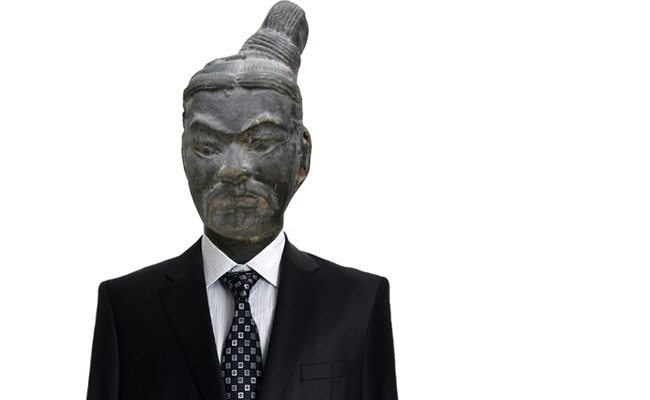Sun Tzu’s The Art of War is the gift that keeps on giving in the world of business strategy
As the great general Sun Tzu led soldiers from the State of Qi into combat more than 2,400 years ago, never could the famed general have known how far his tactical wisdom would spread beyond the battlefields of what is now China’s Shandong province.
The Art of War, Sun Tzu’s only recorded work, has traversed not only oceans and continents, but also disciplines and industries. It has been a favored reference in the publishing and film industries, drawing on what has been called the world’s the most comprehensive yet concise military strategy text. Stacks of titles analyzing and quoting from it claim to give Oriental insight on everything from creativity and spirituality to Formula One racing.
The concept has been extended to cover all sorts of other life issues involving tactics. There is an ‘art of war’ crafted just for women. Lonely men might pick up The Art of War for Dating: Master Sun Tzu’s Tactics to Win Over Women for a little ancient wisdom on romance.
The Art of War has served as the hyper-aggressive business leaders’ credo ever since the infamous character of Gordon Gecko quoted the book in the 1987 financial drama Wall Street.
“I don’t throw darts at a board. I bet on sure things. Read Sun Tzu, The Art of War. Every battle is won before it is ever fought,” Gordon Gecko, the cutthroat Wall Street trader that Michael Douglas plays, declares. Book orders reportedly spiked after the movie came out.
Author and business consultant Gerald Michaelson notes in the introduction to his 2010 book, The Art of War for Managers that Sun Tzu’s work was required reading in venture capitalist Asher Edelman’s entrepreneurship courses at Columbia University in the late 1980s. The class was called ‘Corporate Raiding: The Art of War’.
The HBO TV series The Sopranos also led to a jump in sales after mob boss Tony Soprano told his therapist that he’d been reading the book.
Beyond Hollywood and the hype, business professors today generally agree that The Art of War is far more than a gimmick.
The wisdom of Sun Tzu, predating the teachings of the New Testament by nearly 500 years, has never been more apposite in the business classroom. But the primary language of instruction these days for Sun Tzu is not Chinese, but English. Students at Harvard are far more likely to hear an excerpt from one of the 13 chapters of the short book than those at Peking University.
Acclaimed leadership expert Shalom Saada Saar, Professor of Managerial Practice at Cheung Kong Graduate School of Business, says that one of his recent lectures on The Art of War struck an instant chord with an EMBA student, also the chief executive at a major Chinese company.
“He said that the best partner that he had brought into the business had left for the competitor,” Saar recalls. “He said, ‘I’ve been listening to your lecture for the past few days and now I realize that I didn’t give him time. Now it’s too late.’” Saar had been lecturing on patience, one of several fundamental qualities that Sun Tzu says constitutes an effective leader. On the battlefield, an antsy general will send his soldiers scrambling—like ants, as the ancient master puts it. One-third of them will perish “without taking the city”. In the office, impatient managers and executives will not drive their employees and partners toward better earnings or successful deals, Saar says. Only leaders who demonstrate composure and resilience will retain the confidence of their staff—or armor-laden warriors, depending on the era.
Patience is essential, but it is only one of a list of characteristics that balance a leader. Finding an equilibrium between the two sides of the brain is a fundamental aspect of Sun Tzu, Saar says, as well as highly foretelling.
“He understood the importance of the left brain and right brain,” Saar says. “He talks about wisdom, he doesn’t say intelligence. Wisdom is EQ [emotional quotient]. Here is a man who thought about EQ thousands of years ago.”
Sun Tzu’s insights on battle strategy first became available to the West in the 18th century. The treatise first appeared in the West in French with a work translated by a Jesuit missionary being published in 1772, says author Mark McNeilly in his book, Sun Tzu and the Art of Business.
Surprisingly, as the treatise caught on in the West, its importance waned in China. Sun Tzu today is not a popular subject in Chinese business schools. Western strategy and business thinking has largely supplanted indigenous wisdom. The trend, Saar says, is an unfortunate development in one of the longest traditions of intellectualism and learning.
“The Chinese are so taken by Western knowledge that they have been blinded to their own history. The Chinese don’t know how inventive and innovative this society has been,” Saar says. “The biggest challenge for China in my view is that China is looking toward the West for answers and framework and know-how. I do believe they have it right here, but they’re not looking.”




















